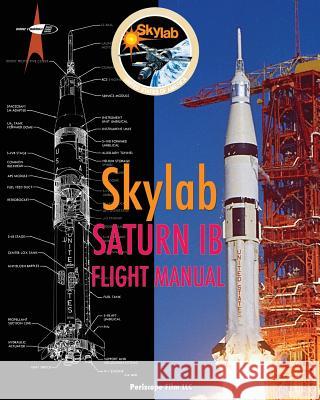Skylab Saturn Ib Flight Manual » książka
Skylab Saturn Ib Flight Manual
ISBN-13: 9781937684204 / Angielski / Miękka / 2013 / 282 str.
Created as an aid for the astronauts training for Skylab missions, this Skylab Saturn IB Flight Manual is a comprehensive reference that contains descriptions of ground support interfaces, prelaunch operations, and emergency procedures. It also summarizes mission variables and constraints, mission control monitoring and data flow during launch and flight. Launch vehicle SL-2 (SA-206; first Skylab manned mission) was used as the baseline for the manual, but the material is also representative of the SL-3 and SL-4 launch vehicles. Also known as the "Uprated Saturn I," Saturn IB was first launched in 1966. The IB replaced the Saturn I's S-IV second stage with the more powerful S-IVB, allowing it to carry a partially fueled Apollo Command / Service Module or fully fueled Lunar Module into low Earth orbit. The Saturn IB allowed critical testing of the Apollo Program's systems to be conducted long before the Saturn V was ready. It also flew one orbital mission without a payload, with the extra fuel used to demonstrate that the S-IVB's J-2 engine could be restarted in zero gravity - a critical operation for translunar injection. The Saturn IB had a height of 141.6 feet and a mass of 1.3 million pounds without payload. It produced thrust equivalent to 1.6 million pounds force, and could carry 46,000 pounds of payload to low Earth orbit. Saturn IB flew nine times, including three Skylab missions and for the Apollo-Soyuz Test Project. Complete with many informative diagrams and photos, this manual is a wonderful reference for the museum docent, researcher, or anyone who ever wondered how these mighty rockets were designed and built.
Created as an aid for the astronauts training for Skylab missions, this Skylab Saturn IB Flight Manual is a comprehensive reference that contains descriptions of ground support interfaces, prelaunch operations, and emergency procedures. It also summarizes mission variables and constraints, mission control monitoring and data flow during launch and flight. Launch vehicle SL-2 (SA-206; first Skylab manned mission) was used as the baseline for the manual, but the material is also representative of the SL-3 and SL-4 launch vehicles.Also known as the "Uprated Saturn I", Saturn IB was first launched in 1966. The IB replaced the Saturn Is S-IV second stage with the more powerful S-IVB, allowing it to carry a partially fueled Apollo Command / Service Module or fully fueled Lunar Module into low Earth orbit. The Saturn IB allowed critical testing of the Apollo Programs systems to be conducted long before the Saturn V was ready. It also flew one orbital mission without a payload, with the extra fuel used to demonstrate that the S-IVBs J-2 engine could be restarted in zero gravity - a critical operation for translunar injection. The Saturn IB had a height of 141.6 feet and a mass of 1.3 million pounds without payload. It produced thrust equivalent to 1.6 million pounds force, and could carry 46,000 pounds of payload to low Earth orbit. Saturn IB flew nine times, including three Skylab missions and for the Apollo-Soyuz Test Project. Complete with many informative diagrams and photos, this manual is a wonderful reference for the museum docent, researcher, or anyone who ever wondered how these mighty rockets were designed and built.











